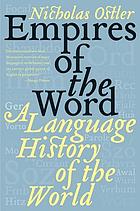preparations for 13 November session

Read this
Ostler, N. (2006). Empires of the word: A language history of the world .
New York: Harper Perennial.-
Languages Today and Tomorrow
pp. 523-560
Think about these issues
... (as) wealth grows, there appears to be an increasing demand to learn and use (European languages), for they are now seen less as symbols of colonial domination and more as crucial keys for access to the global system.
Have we escaped the colonial past and are we now moving into a new, generally balanced, global era?
For many purposes, it is less important how many there are in a linguistic community than who those people are - and how well distributed.
Does this mean that languages of the poor and dispossessed are threatened while languages of the well-to-do and mobile are in ascendance?
For languages, as for any human institution, when you are on top, sooner or later there is only one way to go ... when the language whose use is to be reduced is their own, expect discomfort to be registered ... But no and no decree anywhere has ever yet stemmed the ebbing of a language tide ...
Thinking of this statement in terms of the gradual flow of Spanish speakers into the USA, can (or should) it be stopped with laws and restrictions? Or should we evolve into Spanglish?
A language does not grow through the assertion of power, but through the creation of a larger human community ... A common language is what enables ever more members to participate in it.
What is our future "common language"?

